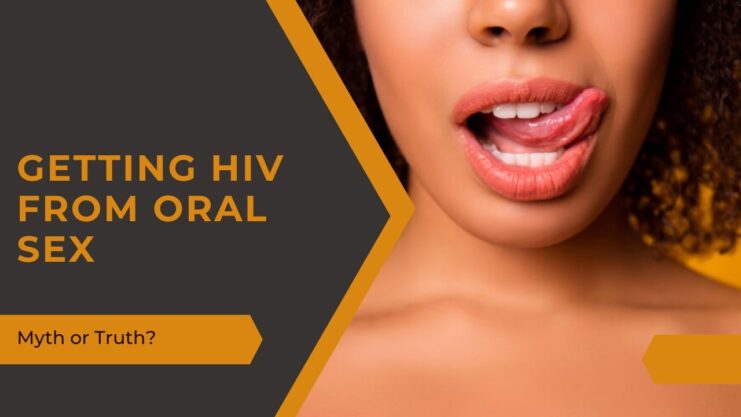When it comes to the transmission of HIV, there’s a lot of misinformation and misconceptions out there. One of the most common concerns that I’ve encountered is the question of whether HIV can be transmitted through oral sex. To answer this question, we first need to understand how medical ‘truths’ are determined.
The Complexity of Medical Truths
Medicine is a field that is rarely black and white. Almost nothing is 100% certain. Medical knowledge is derived from scientific studies and statistical analysis. Once something is deemed ‘statistically significant’, we generally accept it as a fact. However, this also means that a small but definite number of people will fall outside of this ‘statistically significant’ majority.
Conducting scientific studies of high quality and depth to reach a conclusion can be challenging, if not downright impossible. For instance, if we want to determine whether HIV can be transmitted via oral sex, the ideal study would involve a large number of HIV positive individuals performing oral sex on HIV negative individuals, and then monitoring whether any of the HIV negative individuals contract the virus.
However, such a study would be ethically questionable and practically impossible.
Even if we could conduct such a study and found that none of the HIV negative individuals contracted the virus, one could still argue, ‘what if the next person would have been the one to contract HIV?’ Conversely, if even one person contracts HIV, we would have to conclude that HIV can be transmitted by oral sex, right? Not necessarily.
We would have to consider the possibility of confounding factors, such as the individual already having HIV but being in the window period and thus only diagnosed after the experiment.
The Endless ‘What Ifs’

This opens up a Pandora’s box of ‘what ifs’. What if there was an ulcer on the lips? Ulcer on the gums? Sore throat? Cut on the lip? Dry cracked lip? A sore on the penis? Warts on the vulva? False negative HIV tests? False positive HIV test? The list is endless.
Given these complexities, it’s virtually impossible to make a definitive statement such as ‘HIV cannot be transmitted by oral sex’. This is why all the major authorities on HIV, infectious disease, and public health conclude: ‘There is a possibility HIV can be transmitted via oral sex, but this is rare.’
The Scientific Efforts
Despite the challenges, scientists worldwide have been striving to gather data about the risk of HIV transmission via oral sex. They’ve done this through complex questionnaires and intricate statistical analysis.
However, like all experiments involving people, there are too many confounding factors. For instance, people might forget or omit details of sexual activity, people rarely have oral sex alone, the HIV-positive partner may already be on antiretroviral treatment which reduces transmission risk, and so on.
As a result, these scientific studies are still unable to definitively state ‘HIV cannot be transmitted via oral sex’. They arrive at the same conclusion: ‘There is a risk of HIV transmission via oral sex, but this risk is low to minuscule’. This also means you’ll never encounter a doctor who would advise you NOT to have an HIV test because your exposure was ‘only oral sex’.
FAQ
What does ‘statistically significant’ mean in medical research?
Statistically significant’ is a term used in medical research to denote a result that is unlikely to have occurred by chance. When something is statistically significant, it usually indicates that the finding has met a threshold of confidence and reliability. However, this doesn’t imply that the finding applies to every individual, as there will always be outliers or exceptions.
Why is it challenging to conduct an experiment to determine if HIV can be transmitted via oral sex?
For ethical and practical reasons, it’s challenging to conduct such an experiment. Ideally, this would involve HIV positive individuals performing oral sex on HIV negative individuals, and then tracking whether any of the HIV negative individuals contract the virus. Such a study would raise ethical concerns and practical difficulties, making it impossible to execute.
What are confounding factors and how do they impact the transmission of HIV?
Confounding factors are variables that can influence both the dependent variable and independent variable, causing a spurious association. In terms of HIV transmission, confounding factors could include pre-existing health conditions, the presence of other sexually transmitted infections, the use of antiretroviral therapy, and the method of sexual activity involved.
What does the phrase ‘HIV transmission via oral sex is rare’ mean?
When experts say that ‘HIV transmission via oral sex is rare’, they mean that while it is technically possible, the likelihood of such transmission is very low. The risk is increased if there are open sores or cuts in the mouth or on the genitals, but overall, the risk remains low.
What is the influence of antiretroviral treatment on HIV transmission?
Antiretroviral treatment significantly reduces the risk of HIV transmission. This is because the medication reduces the viral load in an HIV positive person’s body, which in turn reduces the likelihood of passing the virus to someone else, even through unprotected sex. However, it’s still important to use protection to guard against other sexually transmitted diseases.
The Bottom Line: Understanding Your Risk
If you’re worried about having contracted HIV via oral sex, it’s crucial to remember this one very important fact: YOUR RISK IS EXTREMELY LOW. This holds true even if you think you might have a small cut, small scratch, infected hair gland, mouth ulcer, bleeding gums, etc.
However, it’s important to remember that a LOW risk does not equate to NO risk. You still need to get yourself tested. But rest assured, the chances are high that you’ll be okay.












